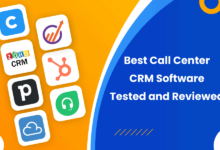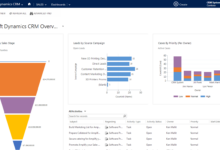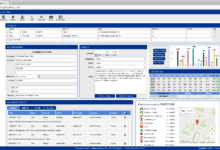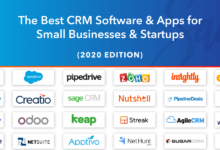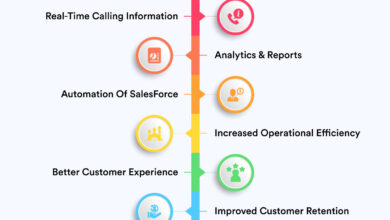Services CRM Software: A Comprehensive Guide
Services CRM software revolutionizes how businesses manage customer interactions and service delivery. It moves beyond simple sales tracking, offering robust tools for managing service requests, scheduling technicians, and tracking service level agreements (SLAs). This guide delves into the core functionalities, benefits, and future trends of this powerful technology, empowering businesses to optimize their service operations and enhance customer satisfaction.
Understanding the nuances of services CRM is crucial for businesses aiming to streamline their service processes and foster stronger client relationships. From choosing the right platform to leveraging automation and AI, this exploration will equip you with the knowledge to harness the full potential of services CRM software.
Defining “Services CRM Software”
Services CRM software is a specialized type of customer relationship management (CRM) system designed to manage and optimize the delivery of services to customers. Unlike sales CRM, which focuses on acquiring new customers, services CRM prioritizes the ongoing relationship with existing clients, ensuring their satisfaction and retention. It streamlines service delivery processes, improves communication, and enhances overall customer experience.
Services CRM software provides a centralized platform to manage all aspects of service delivery, from initial request to resolution and follow-up. This includes managing customer interactions, tracking service requests, scheduling appointments, managing technicians or agents, and measuring service performance. The ultimate goal is to improve efficiency, reduce costs, and increase customer satisfaction.
Core Functionalities of Services CRM Software
Several core functionalities are crucial to effective services CRM. These features enable businesses to efficiently manage service requests, track performance, and improve customer relationships. These include:
- Ticket Management: A system for logging, tracking, and resolving customer service requests, often using a ticketing system to categorize and prioritize issues.
- Knowledge Base: A repository of self-service information, allowing customers to find solutions independently and reducing the burden on support agents.
- Scheduling and Dispatch: Tools to schedule appointments, assign tasks to service agents, and optimize routes for field service technicians.
- Customer Interaction Management: A platform to record and manage all communications with customers, including emails, phone calls, and chat sessions.
- Reporting and Analytics: Tools to track key performance indicators (KPIs) such as resolution time, customer satisfaction, and agent performance.
Key Differences Between Services CRM and Sales CRM
While both sales and services CRM aim to improve customer relationships, their focuses differ significantly. Sales CRM prioritizes lead generation, sales pipeline management, and closing deals. Services CRM, conversely, focuses on post-sales activities, enhancing customer satisfaction, and building long-term relationships. The key differences can be summarized as follows:
| Feature | Sales CRM | Services CRM |
|---|---|---|
| Primary Focus | Acquiring new customers | Managing existing customer relationships |
| Key Metrics | Sales revenue, conversion rates, lead generation | Customer satisfaction, resolution time, service efficiency |
| Typical Activities | Lead nurturing, sales forecasting, opportunity management | Ticket management, scheduling, knowledge base management |
| Typical Users | Sales representatives, sales managers | Customer service agents, field service technicians, support managers |
Industries That Heavily Rely on Services CRM Software
Many industries benefit from using services CRM software to manage their service operations. These industries often deal with a large volume of customer interactions and require efficient service delivery. Some prime examples include:
- Telecommunications: Managing customer service requests, troubleshooting technical issues, and scheduling installations.
- Field Service (HVAC, Plumbing, Electrical): Scheduling appointments, dispatching technicians, tracking job progress, and managing inventory.
- Healthcare: Managing patient appointments, tracking medical records, and improving communication between healthcare providers and patients.
- IT Support: Tracking and resolving IT issues, managing help desk tickets, and providing remote support.
- Financial Services: Managing customer inquiries, resolving account issues, and providing personalized financial advice.
Comparison of Leading Services CRM Platforms
Several leading platforms offer services CRM solutions. Choosing the right one depends on specific business needs and budget. The following table compares three popular options (Note: Pricing is approximate and can vary based on features and user count):
| Feature | Zendesk | Salesforce Service Cloud | Freshdesk |
|---|---|---|---|
| Pricing | Starts at $49/agent/month | Starts at $75/user/month | Starts at $15/agent/month |
| Integrations | Wide range of integrations with other business tools | Extensive integration capabilities within the Salesforce ecosystem | Integrates with popular apps and services |
| Customer Support | 24/7 support via phone, email, and chat | Comprehensive support options, including online resources and dedicated support teams | Robust support resources, including email, chat, and community forums |
Key Features of Services CRM Software
Choosing the right services CRM software can significantly impact a business’s efficiency and customer satisfaction. A robust system goes beyond basic contact management; it streamlines operations, improves team collaboration, and ultimately drives revenue growth. This section highlights key features that distinguish excellent services CRM solutions from their less effective counterparts.
Top Five Differentiating Features of Excellent Services CRM Software
The selection of a services CRM should prioritize features that directly address the unique challenges of service-based businesses. Focusing on these key areas ensures a system that truly optimizes operations and enhances customer relationships.
- Comprehensive Service Scheduling and Dispatch: This includes features like automated scheduling, optimized routing for field technicians, real-time tracking of service appointments, and integration with GPS systems. This functionality minimizes travel time, improves response times, and enhances overall service efficiency.
- Advanced Reporting and Analytics: Data-driven decision-making is crucial. A strong services CRM provides comprehensive reporting capabilities, allowing businesses to track key metrics such as service completion rates, customer satisfaction scores, and technician performance. This data informs strategic decisions and identifies areas for improvement.
- Seamless Customer Communication Tools: Effective communication is paramount. The best services CRM solutions integrate multiple communication channels (email, SMS, in-app messaging) allowing for consistent and efficient interaction with customers throughout the service lifecycle. This fosters transparency and strengthens customer relationships.
- Robust Knowledge Base and Self-Service Portal: Empowering customers with self-service options reduces support ticket volume and improves overall efficiency. A comprehensive knowledge base, accessible through a customer portal, allows customers to find answers to common questions independently. This frees up support staff to handle more complex issues.
- Integration with Other Business Systems: A truly effective services CRM seamlessly integrates with other crucial business systems, such as accounting software, inventory management systems, and project management tools. This integration eliminates data silos, ensures data consistency, and streamlines workflows across different departments.
Field Service Management Capabilities
Field service management (FSM) is a critical component of a successful services CRM. Effective FSM capabilities significantly impact a company’s ability to deliver timely, efficient, and high-quality service. These capabilities are not merely add-ons; they are integral to the core functionality.
FSM capabilities encompass several key areas: real-time location tracking of field technicians, automated scheduling and dispatching based on technician availability and proximity to customer locations, mobile access to customer information and service history for technicians, and the ability to manage inventory and parts directly within the field service application. The integration of these features optimizes workflows, reduces response times, and enhances overall customer satisfaction. For example, a landscaping company using FSM can efficiently schedule multiple crews for different jobs, ensuring optimal resource utilization and timely completion of services.
The Role of Automation in Improving Service Delivery
Automation plays a crucial role in improving service delivery by optimizing workflows and reducing manual tasks. Within a services CRM, automation can be applied to several key areas.
Automated features include: automatic email confirmations for service appointments, automated reminders to customers, automated routing of service requests to the appropriate technicians, and automated generation of service reports. These automated processes free up staff time, reduce errors, and ensure consistency in service delivery. Consider a telecommunications company; automating appointment reminders via SMS reduces the number of missed appointments and improves customer satisfaction.
Workflow Diagram for a Typical Service Request
The following describes a typical service request workflow within a services CRM system.
Imagine a customer submits a service request through the company website. The request is automatically logged in the CRM, triggering an automated email confirmation to the customer. The system then routes the request to the appropriate technician based on skills, availability, and location using optimized routing algorithms. The technician receives a notification on their mobile device and accepts the request. Upon service completion, the technician updates the status in the CRM, which automatically generates an invoice and sends a customer satisfaction survey. The entire process is tracked and reported on, providing valuable data for business improvement.
Benefits of Implementing Services CRM Software
Implementing a services CRM offers significant advantages for businesses of all sizes, leading to improved customer relationships, streamlined operations, and ultimately, increased profitability. By centralizing customer information, automating processes, and providing valuable insights, a services CRM empowers organizations to deliver exceptional service and achieve a strong return on investment.
Case Studies Demonstrating ROI
Several companies have reported substantial returns on investment after implementing services CRM software. For example, a mid-sized telecommunications company saw a 15% reduction in customer churn within six months of adopting a new CRM system. This was attributed to improved issue resolution times and proactive customer engagement enabled by the CRM’s features. Another case involves a field service company that experienced a 20% increase in technician efficiency due to optimized scheduling and real-time communication facilitated by their CRM. These gains translate directly into cost savings and increased revenue generation.
Impact on Customer Satisfaction Compared to Traditional Methods
Services CRM significantly enhances customer satisfaction compared to traditional methods. Traditional methods, often involving disparate systems and manual processes, often lead to fragmented customer interactions, missed service requests, and inconsistent service delivery. A services CRM, in contrast, provides a unified view of the customer, allowing service representatives to access complete history, past interactions, and current requests. This holistic view enables personalized service, faster resolution times, and proactive problem-solving, directly contributing to higher customer satisfaction scores and loyalty. Studies have shown that companies using CRM systems experience significantly higher customer satisfaction rates (often exceeding 20%) compared to those relying on traditional, less integrated approaches.
Metrics for Measuring Services CRM Effectiveness
Effective measurement of a services CRM implementation requires a strategic approach. Key metrics include: customer satisfaction (CSAT) scores, Net Promoter Score (NPS), average resolution time (ART), first contact resolution (FCR), customer churn rate, and operational efficiency metrics such as average handle time (AHT) and cost per case. Tracking these metrics provides valuable insights into the impact of the CRM system and identifies areas for improvement. For instance, a consistent decrease in ART and an increase in FCR indicate improved service efficiency and customer satisfaction.
Improving Operational Efficiency and Reducing Costs
Services CRM software directly improves operational efficiency and reduces costs in several ways. Automation of tasks such as scheduling, dispatching, and reporting frees up valuable employee time, allowing them to focus on higher-value activities. Improved communication and collaboration features within the CRM reduce errors and delays, streamlining workflows and minimizing operational costs. Real-time data and analytics provided by the CRM allow for proactive identification of issues and optimization of resource allocation, further contributing to cost reduction. For example, improved scheduling through optimized routing can significantly reduce fuel costs for field service organizations, while automated reporting can eliminate the need for manual data entry and analysis.
Choosing the Right Services CRM Software
Selecting the ideal services CRM software is crucial for optimizing business operations and enhancing customer relationships. The right system will streamline workflows, improve service delivery, and ultimately boost profitability. A careful evaluation process, considering various factors, is essential for a successful implementation.
Factors to Consider When Selecting Services CRM Software
The selection of services CRM software requires a thorough assessment of several key factors. Ignoring these aspects can lead to an unsuitable solution that fails to meet business needs and may even hinder productivity. A comprehensive checklist should include considerations relating to functionality, integration capabilities, scalability, cost, and vendor support.
- Functionality: Does the software offer the specific features needed to manage service requests, track resolutions, and analyze performance metrics? Consider features like ticketing systems, knowledge bases, scheduling tools, and reporting dashboards.
- Integration: Can the CRM integrate seamlessly with existing systems like accounting software, help desk tools, and communication platforms? Seamless integration prevents data silos and ensures efficient data flow.
- Scalability: Can the software accommodate future growth in terms of user base, data volume, and service demands? Scalability is crucial for long-term cost-effectiveness and prevents system limitations as the business expands.
- Cost: Consider not only the initial investment but also ongoing costs such as maintenance, support, and potential upgrades. Compare total cost of ownership across different vendors.
- Vendor Support: Assess the vendor’s reputation, customer support responsiveness, and training resources. Reliable support is crucial for addressing technical issues and maximizing software utilization.
- User-Friendliness: The software should be intuitive and easy for your team to use. A complex interface can lead to low adoption rates and hinder productivity.
Cloud-Based versus On-Premise Services CRM Solutions
The choice between cloud-based and on-premise deployments significantly impacts cost, maintenance, and accessibility. Cloud-based solutions offer advantages in terms of accessibility, scalability, and reduced upfront costs, while on-premise solutions provide greater control over data security and customization.
- Cloud-Based: Cloud solutions are hosted on the vendor’s servers, accessible from anywhere with an internet connection. They typically involve subscription fees and require minimal IT infrastructure. Examples include Salesforce Service Cloud and Zendesk.
- On-Premise: On-premise solutions are installed and maintained on the company’s own servers. They offer greater control over data security and customization but require significant upfront investment in hardware and IT expertise. This approach may be suitable for companies with highly sensitive data or specific security requirements.
Scalability and Customization Options in a Services CRM
Scalability and customization are paramount for long-term success. A scalable system can adapt to changing business needs without requiring costly overhauls, while customization ensures the software aligns perfectly with specific workflows and processes.
Scalability refers to the system’s ability to handle increasing data volumes, user accounts, and transaction loads without performance degradation. For example, a rapidly growing company might need a CRM that can effortlessly handle a tenfold increase in customer interactions within a year. Customization allows businesses to tailor the software to their unique processes. This might involve configuring workflows, creating custom fields, or integrating with specific third-party applications. For instance, a company might need to customize its CRM to integrate with a specialized inventory management system.
Decision Matrix for Evaluating Services CRM Vendors
A decision matrix provides a structured approach to comparing different vendors. By assigning weights to key criteria and scoring each vendor, businesses can objectively assess their suitability.
| Criteria | Weight | Vendor A | Vendor B | Vendor C |
|---|---|---|---|---|
| Functionality | 30% | 8 | 7 | 9 |
| Integration | 20% | 7 | 9 | 6 |
| Scalability | 20% | 9 | 8 | 7 |
| Cost | 15% | 7 | 6 | 8 |
| Support | 15% | 8 | 7 | 9 |
| Weighted Score | 7.85 | 7.35 | 7.95 |
In this example, Vendor C emerges as the top choice based on the weighted scores assigned to each criterion. The weights reflect the relative importance of each factor to the specific business needs. This matrix simplifies the complex decision-making process, allowing for a more data-driven selection.
Integration and Customization of Services CRM Software
Effective integration and customization are crucial for maximizing the value of services CRM software. Seamless data flow between your CRM and other business systems streamlines operations, improves data accuracy, and enhances overall efficiency. Meanwhile, customization ensures the software adapts to your unique business processes and workflows, leading to a more user-friendly and productive experience.
Integrating a services CRM with other business applications, such as accounting, inventory management, or marketing automation platforms, typically involves using APIs (Application Programming Interfaces). These APIs act as bridges, allowing different software systems to communicate and exchange data automatically. For instance, customer data updated in the CRM can be automatically reflected in the accounting system, eliminating manual data entry and reducing the risk of errors. Customization, on the other hand, often involves configuring existing features or developing custom functionalities to meet specific business needs.
API Integration Methods
Several methods facilitate the integration of a services CRM with other business applications. Direct API integration involves using the CRM’s publicly available API to build custom connections. This offers the greatest flexibility but requires technical expertise. Pre-built integrations, offered by either the CRM vendor or third-party integration platforms, provide a simpler, faster approach for connecting to popular applications. Finally, ETL (Extract, Transform, Load) processes can be used to periodically transfer data between systems. This is a suitable approach for less frequent data synchronization needs.
Common Customization Options
Services CRM software often offers various customization options. These may include configuring workflows to automate tasks such as service ticket assignment or escalation, tailoring dashboards to display key performance indicators (KPIs) relevant to the business, and customizing reports to provide specific insights into service performance. More advanced customizations might involve creating custom fields to capture specific data points relevant to the business or integrating with external systems using custom-built APIs. For example, a field could be added to track the specific equipment used during a service call.
Challenges of Integrating Legacy Systems
Integrating legacy systems with modern services CRM platforms can present significant challenges. Legacy systems often lack robust APIs or use outdated data formats, making integration complex and potentially costly. Data migration can be time-consuming and prone to errors. Furthermore, differences in data structures between the legacy system and the CRM can require significant data transformation efforts. For example, integrating an old, on-premise accounting system with a cloud-based CRM might require significant data mapping and cleansing to ensure data consistency.
Sample API Integration for Customer Information Update
A sample API integration for updating customer information from an external source might involve a POST request to the CRM’s API endpoint for customer updates. The request body would contain the updated customer data in a structured format, such as JSON. The CRM’s API would then validate the data and update the customer record accordingly. An example JSON payload could be:
“customerId”: 123,
“firstName”: “John”,
“lastName”: “Doe”,
“email”: “john.doe@example.com”,
“phoneNumber”: “555-123-4567”
The CRM’s API would respond with a success or error message, indicating whether the update was successful. Error handling is crucial to ensure data integrity and to allow for retry mechanisms in case of temporary network issues. Robust error handling is a key aspect of a well-designed API integration.
The Future of Services CRM Software
The services CRM landscape is poised for significant transformation, driven by technological advancements and evolving customer expectations. The integration of artificial intelligence, the rise of mobile-first strategies, and the increasing demand for personalized service are shaping the future of how businesses manage and optimize their customer interactions. This section explores key emerging trends and predictions for the next five years.
Emerging Trends in Services CRM Technology
Several key technological advancements are reshaping the services CRM space. These trends are not isolated but rather interconnected, creating a synergistic effect that enhances overall customer experience and operational efficiency. For instance, the convergence of CRM with other enterprise software systems is becoming increasingly prevalent, allowing for a more holistic view of the customer journey. Similarly, the rise of predictive analytics empowers businesses to anticipate customer needs and proactively address potential issues. The integration of IoT (Internet of Things) data is another significant trend, allowing services CRM systems to incorporate real-time data from connected devices to provide more informed and targeted support.
The Role of AI and Machine Learning in Enhancing Services CRM Functionalities
Artificial intelligence (AI) and machine learning (ML) are rapidly transforming services CRM capabilities. AI-powered chatbots, for example, provide instant customer support, handling routine inquiries and freeing up human agents to focus on more complex issues. ML algorithms analyze vast amounts of customer data to identify patterns and predict future behavior, enabling proactive service interventions and personalized recommendations. This predictive capability allows businesses to anticipate potential service issues, leading to improved customer satisfaction and reduced operational costs. For example, a telecommunications company might use ML to identify customers at high risk of churning based on their usage patterns and contact history, allowing proactive intervention to retain the customer.
The Impact of Mobile Accessibility on the Future of Services CRM
Mobile accessibility is no longer a luxury but a necessity for modern services CRM systems. With the increasing reliance on smartphones and tablets, businesses must ensure their CRM systems are fully optimized for mobile access. This means providing seamless access to customer data, communication tools, and service management features across various mobile devices. Mobile-first CRM solutions empower field service technicians, sales representatives, and customer support agents to access critical information and perform their tasks efficiently, regardless of their location. A field service company, for example, could leverage a mobile CRM app to schedule appointments, track technician locations, and provide real-time updates to customers, enhancing efficiency and transparency.
Predictions for the Evolution of Services CRM in the Next Five Years
Over the next five years, we can expect to see a continued convergence of CRM with other enterprise systems, leading to more integrated and holistic views of the customer. AI and ML will become even more deeply embedded in services CRM functionalities, driving automation, personalization, and predictive capabilities. The adoption of cloud-based CRM solutions will continue to accelerate, offering scalability, flexibility, and cost-effectiveness. Finally, the focus on customer experience will remain paramount, with services CRM systems playing a central role in delivering personalized, proactive, and efficient service interactions. We predict a significant increase in the use of augmented reality (AR) and virtual reality (VR) in service delivery, allowing for remote assistance and more engaging customer experiences. Companies such as those in the tech repair sector could utilize AR to guide customers through troubleshooting steps remotely, reducing the need for on-site visits.
End of Discussion
In conclusion, implementing the right services CRM software can significantly improve operational efficiency, boost customer satisfaction, and ultimately drive profitability. By carefully considering factors such as scalability, integration capabilities, and the specific needs of your business, you can select a solution that aligns with your goals and empowers your team to deliver exceptional service. The future of services CRM is bright, with advancements in AI and mobile accessibility promising even greater efficiency and customer engagement.
